
 |
|
|
#1 |
|
Member
Join Date: Jan 2006
Posts: 29
|
Hi,
I wanted to show my collection, and ask if anyone knows if these are all parangs of the Iban tribe of Sarawak or if they are from other tribes (or if it is even possible to say that). The first four: My parents brought them from Malaysia some 30 or more years ago (my Mom is from Sarawak, my Dad is from Germany but worked there, and they brought a lot of stuff with them when they moved to Germany): 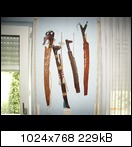 Another two, my mom brought them from Sarawak in 2007, so I don't know if they are old or new.  Hope they are not tourist art. Hope they are not tourist art. And I also got one blowpipe and two spears: 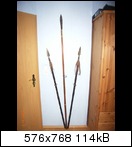 ----------------------------------------------------- And finally, I also have a Piso Podang of the Batak tribe of Sumatra. This weapon had made it's way to Borneo into the possession of my mom's family. I don't know the age. My mom then brought it to Germany. Such Piso Podang are not common, but can sometimes be found in the old heirlooms of Iban families (who didn't already sell it). The Japanese style sword below is just worthless souvenir stuff from Spain, don't look at it  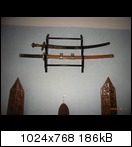
|
|
|

|
|
|
#2 |
|
Keris forum moderator
Join Date: Aug 2006
Location: Nova Scotia
Posts: 7,130
|
Can't tell much about these without seeing the blades and lots of close-up photos. Just on the surface they look like the kind of stuff made for the higher end tourist trade.

|
|
|

|
|
|
#3 |
|
Member
Join Date: Jan 2006
Posts: 29
|
All items except for the two parangs in pic #2 are well over 30 years old (I mean: They are in Germany since more than 30 years. How long they have existed before is beyond my knowledge). Did a "tourist art" industry already exist back then?
|
|
|

|
|
|
#4 |
|
(deceased)
Join Date: Dec 2004
Location: OKLAHOMA, USA
Posts: 3,138
|
THE HEADHUNTING DAYS WERE OVER LONG AGO BUT THE TOURIST HUNTING DAYS WERE IN FULL SWING 30 YEARS AGO AND TOURISTS ARE STILL IN SEASON.
 IN YOUR FIRST PICTURE THE SMALLEST OF THE FOUR MANDAU APPEARS TO BE ONE MADE FOR ACTUAL VILLAGE USE AND MAY BE THE OLDEST. THE OTHERS WERE MADE EITHER FOR TOURISTS POSSIBLY FOR USE IN SHOWS FOR TOURISTS. THEY MAY ALSO HAVE BEEN USED IN CEREMONIES OR FOR PRESENTATION TO IMPORTANT VISITORS. THE OTHER TWO MANDAUS FALL INTO THIS CATAGORY. SOMETIMES A MANDAU LIKE THIS DOES HAVE A GOOD OLD BLADE BUT MOST OF THE TIME IT IS A NEW ONE AND THEY SOMETIMES EAT THE BLADES UP WITH ACID TO MAKE IT LOOK OLD. THE TWO SPEARS LOOK TOURIST DEFINITELY NOT TRADITIONAL DAYAK FORMS. THE SUMPIT (BLOWGUN) LOOKS GOOD BUT IF IT IS OLD OR NEW I CANT SAY. THE PISO PODANG IS FAIRLY COMMON IN BORNEO MOSTLY IN KUCHING I DON'T KNOW WHY THEY ARE THERE BUT IT WOULD SEEM A LOT OF THEM ARRIVED AS TRADE GOODS SOME TIME IN THE PAST. A NICE DISPLAY NOT OFTEN SEEN WHERE YOU NOW LIVE 
|
|
|

|
|
|
#5 | |
|
Member
Join Date: Nov 2006
Location: The Netherlands
Posts: 2,225
|
Quote:
On Nias tourist trade started maybe somewhere in 1930's As for these mandau's, parangs etc, pictures of the blades would be helpfull. The handle and scabbard may be newer than the blade. But to give my humble first opinion : 1st picture : left one looks like complete tourist to me. the others might well be contemporary examples.  2nd picture : both tourist IMHO 3rd picture : sumpitan looks tourist to me, spears, not even Borneo i think. 4th picture : podang : yep, that is the real thing.  more pics of that one please... more pics of that one please...
|
|
|
|

|
|
|
#6 | |
|
Member
Join Date: Jan 2006
Posts: 29
|
So, except for the Piso Podang (and possibly the smallest one in pic #1) all of them are tourist art? That's kinda disappointing. But well, what could I expect.
I can confirm that the small parang is most probably a working tool. It has a pretty thick blade with no decorations at all. The other one's have more or less decorated blades. Quote:
 But I can show you two pics of another Piso Podang that hangs in my grandma's longhouse in Sarawak. I took two snapshots of it when I visited last time.   Is there any good literature on Iban "cutlery" out there? As a half-Iban who didn't grow up there I'm interested in all things Iban, but whereas ethnologic stuff about agriculture, history etc. can be found quite abundant, specialized literature on their swords has not shown up to me so far. greetings and thanks |
|
|
|

|
|
|
#7 | |
|
Member
Join Date: Feb 2007
Location: Kaboejoetan Galoenggoeng Mélben
Posts: 460
|
Hullo everybody!
Quote:
Best, |
|
|
|

|
|
|
#8 | |
|
Keris forum moderator
Join Date: Aug 2006
Location: Nova Scotia
Posts: 7,130
|
Quote:
I look forward to seeing the blades on some of these Dinggat. Until then we are only really guessing. |
|
|
|

|
|
|
#9 | |
|
Member
Join Date: Feb 2007
Location: Kaboejoetan Galoenggoeng Mélben
Posts: 460
|
Hullo again,
Quote:
I really came back to take advantage of this thread and post pix for ID of some ex-Kalimantan pieces in my collection (not really my area). Just a general ID is OK. Best, |
|
|
|

|
|
|
#10 |
|
Member
Join Date: Jan 2007
Location: The Netherlands
Posts: 1,354
|
According to the book of Evans about North Borneo tribes, the "podang" he is calling a "pedang" was used also in North Borneo (Sabah). There is also a pic of a man carrying a "podang" with him.
Also the Ibans, as already known, liked this sword to be handled. Evans is saying that "probably" these blades were made in Brunei. This State lies between Sarawak and Sabah, so in my opinion this could be true. Does anyone has read other information written about it? Dinggat, you should buy yourself the book "iban art" from Heppell. It is a very nice book with nice pictures (You can also see this "podang" in it.) PS. the dayakswords your grandmother has in her house looks like the real thing. You can see already there the difference in used ones (grandmother), and not used ones (not included your "podang" as Willem already said).  Regards, Maurice |
|
|

|
|
|
#11 |
|
Member
Join Date: Jan 2006
Posts: 29
|
I can at least confirm that the Iban sometimes prefer to use a Piso Podang (PP) for their traditional dances and performances instead of a real Iban weapon. Possibly an antique PP is a more prestigious thing to own for the individual Iban than a mere "normal" parang that everyone has.
But one more thing I'm curious about: Unfortunately the blade of my PP is pretty rusted, but still I seem to remember that a smith's signature on the blade was visible. The funny thing is: The signature was made from European/Latin letters. What meaning could this have in regards to the "realness" of the weapon? |
|
|

|
|
|
#12 | |
|
Member
Join Date: Feb 2007
Location: Kaboejoetan Galoenggoeng Mélben
Posts: 460
|
Quote:
I wouldn't worry about the 'realness' of the implement (of course this depends on how strict/purist you are). It's quite common to use non-local blades (be it from other regions or other countries) with local hilts/dress . As a matter of fact, in the 17th-18th centuries, VOC trade blades (manufactured by its foundaries in India and elsewhere in the East Indies) were commonly used throughout the Archipelago. As for whether it's a 'pedang' or 'podang' (or even 'peudeueng'). I wouldn't worry about it too much. This is just a variation in the local language, similar to 'sword', 'zwaard' and 'schwert'. Basically the same. In Brunei, the Malay spoken has always been the closest to Bahasa Indonesia, in essence, the Archipelago trade lingua franca. In Sabah, there is a strong Batak influence, particularly among some tribes, such as the Tawau (where they speak Malay with a Batak flavour). Hope this helps. Best, |
|
|
|

|
|
|
#13 |
|
Member
Join Date: Jan 2006
Posts: 29
|
Oh, I'm not purist in any kind of way. I just want to find out as much as possible about this particular weapon. It's not like I would throw it away if I found out it was not "the real thing".
 As an amatuer linguist who learns a few Austronesian languages I'm very aware of the local differences (Podang, Pedang etc.). Apart from actual dialectic differences such different spellings can often be traced back to the Europeans who where the first one's to put a native language to paper. What sounded like "Pedang" to a British colonialist might have sounded like a "Podang" to his Dutch colleague, even though they basically heard the same word. |
|
|

|
|
|
#14 |
|
Member
Join Date: Feb 2007
Location: Kaboejoetan Galoenggoeng Mélben
Posts: 460
|
Hullo Dinggat,
I just found some old notes on Kalimantan. Apparently, at some stage, I found that the Batak type sword was common in northern and western Kalimantan. I'll get back to you when I find some more info (or perhaps you'll already have it before then). Best, Last edited by Amuk Murugul; 8th May 2009 at 09:14 PM. Reason: correction of recipient nick |
|
|

|
|
|
#15 |
|
Member
Join Date: Jan 2007
Location: The Netherlands
Posts: 1,354
|
|
|
|

|
|
|
#16 | |
|
Member
Join Date: Feb 2007
Location: Kaboejoetan Galoenggoeng Mélben
Posts: 460
|
Hullo everybody,
Quote:
Dinggat, To iterate, the Indian/Batak style sword was quite common among the native population of the northern and western parts of the island. This was the area where the Iban were the predominant people, having expanded to West Kalimantan and Sabah from their ancestral homeland in the Batang Lupar River area (particularly in the last half of the 19th century). So it comes as no surprise that your family owns one. Best, |
|
|
|

|
|
|
#17 |
|
Member
Join Date: Jan 2006
Posts: 29
|
Thank you all very much. So trade distributed the Piso Podangs to Borneo into the hands of the Iban (and I suppose other ethnic groups as well). I hope I wont forget to take the photos next time I'm home.
|
|
|

|
|
|
#18 | |
|
Member
Join Date: Nov 2006
Location: The Netherlands
Posts: 2,225
|
Quote:
|
|
|
|

|
|
|
#19 |
|
Member
Join Date: Dec 2004
Location: Sweden
Posts: 1,637
|
Nice sword collection A.M.
Next to your (probably not Borneo made but in this case) Batak Podang is a rare Malay sword called Chenangkas. And next to it a Parang Negara from the South. Could you please upload some more pictures of the Chenangkas? If there is a face on the nice Kutei/Modang mandau far right maybe you could upload it on the face thread? Michael |
|
|

|
|
|
#20 | |
|
Member
Join Date: Jan 2006
Posts: 29
|
Quote:
I'll try to get my hands on a copy of that book. |
|
|
|

|
|
|
#21 |
|
Member
Join Date: Dec 2004
Location: Sweden
Posts: 1,637
|
Dinggat,
On the Borneo Pedang you see hair tufts quite often. On the resembling Sumatran/Batak Piso Podang or the Malay Peninsular Pedang Shamshir it's not usual. Please note that most Pedang found in Borneo probably were made locally, like in the sword factories in Brunei as described in Evans. I doubt the old ones were imported from the Bataks. If imported I find it more probable they came from Malaysia or India, according to Gardner. Michael |
|
|

|
|
|
#22 |
|
Member
Join Date: Jan 2006
Posts: 29
|
Thanks for all those enlightening informations
 Is it known why exactly did the Batak choose to create hollow pommels if they did not put anything in there? Within that hollow space there's a small "sting" at my PP, I guess that's always the case. I hope all my questions are not too annoying. In the end I'm just playing parasite on all the knowledge that you probably gained by years-long research. |
|
|

|
|
|
#23 |
|
(deceased)
Join Date: Dec 2004
Location: OKLAHOMA, USA
Posts: 3,138
|
THIS MAY BE JUST A STORY OR THE TRUTH SO UNTIL IT CAN BE PROVEN I TELL IT JUST AS A STORY.
 I WAS TOLD THE HOLLOW POMMEL REPRESENTS THE CUP MOHAMMED DRANK FROM EITHER BEFORE OR AFTER A BIG BATTLE. PERHAPS SOMEONE CAN FIND OUT IF THERE IS ANY FACTUAL BASE FOR THE STORY. |
|
|

|
|
|
#24 |
|
Member
Join Date: Jan 2006
Posts: 29
|
True or not, at least it is an interesting theory.
|
|
|

|
|
|
#25 | |
|
Member
Join Date: Feb 2007
Location: Kaboejoetan Galoenggoeng Mélben
Posts: 460
|
Quote:
Here are the pix, as requested. Sorry about the delay. BTW, no face that I can see on the mandau. Best, |
|
|
|

|
|
|
#26 |
|
Member
Join Date: Dec 2004
Location: Sweden
Posts: 1,637
|
Thanks for sharing.
This is one of the most interesting swords I have seen so far this year (and I see a lot of Malay and Indonesian swords when I travel!). I could just speculate that the hilt could be from NW Borneo and the blade imported. One of a kind! If you ever get tired of it please let me know.... Michael |
|
|

|
|
|
#27 |
|
Member
Join Date: Jan 2006
Posts: 29
|
I made some photos of the other parang blades. Maybe some of you are interested (question "real deal vs. tourist art"):
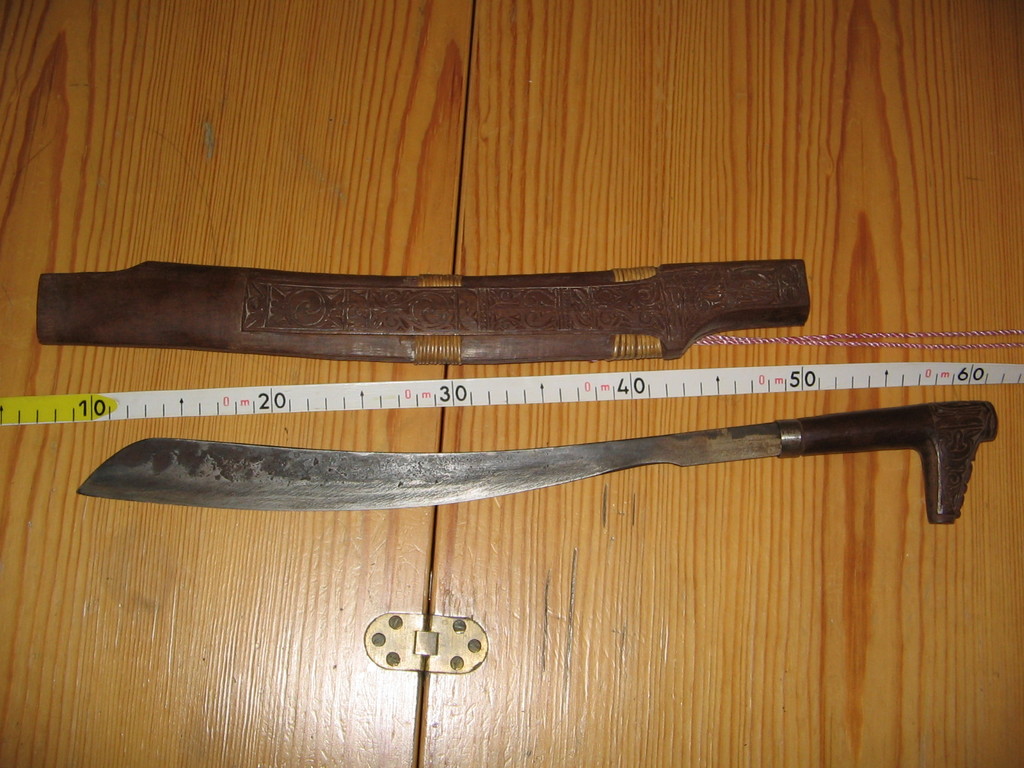 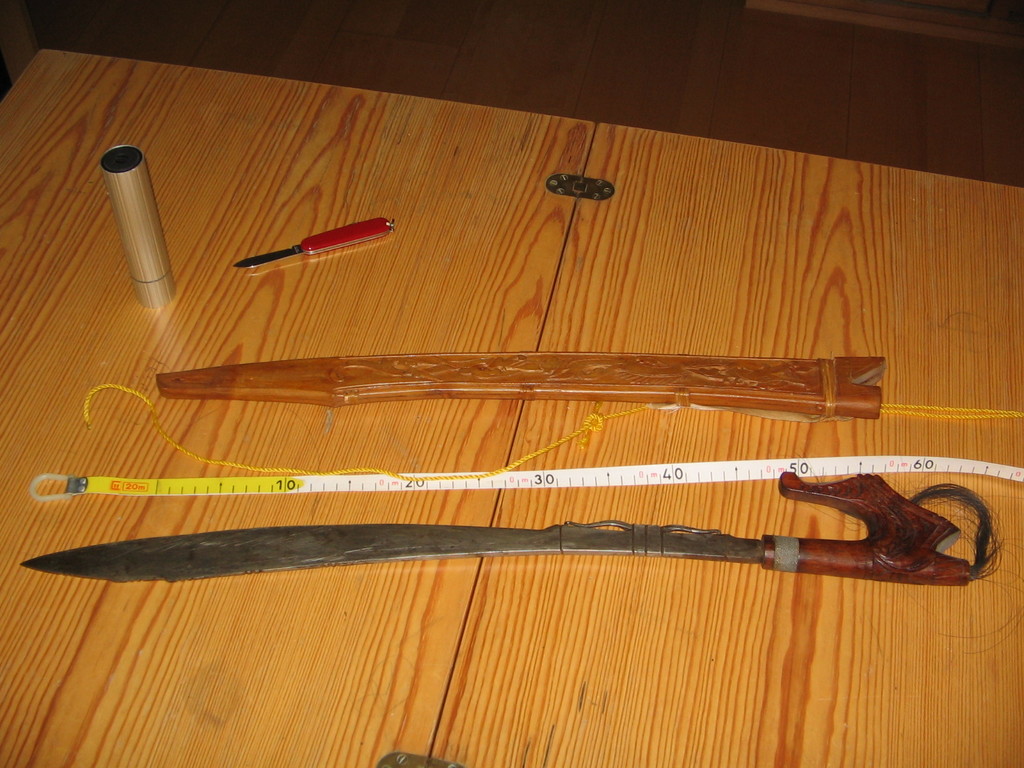 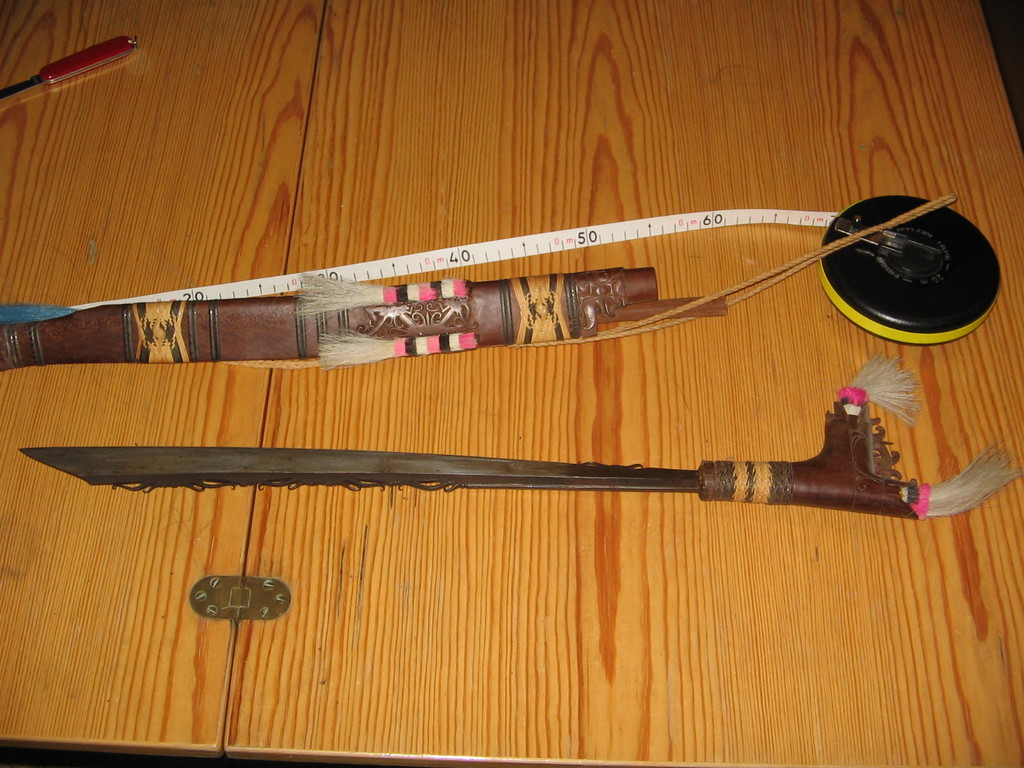
|
|
|

|
|
|
#28 |
|
Member
Join Date: Jan 2006
Posts: 29
|
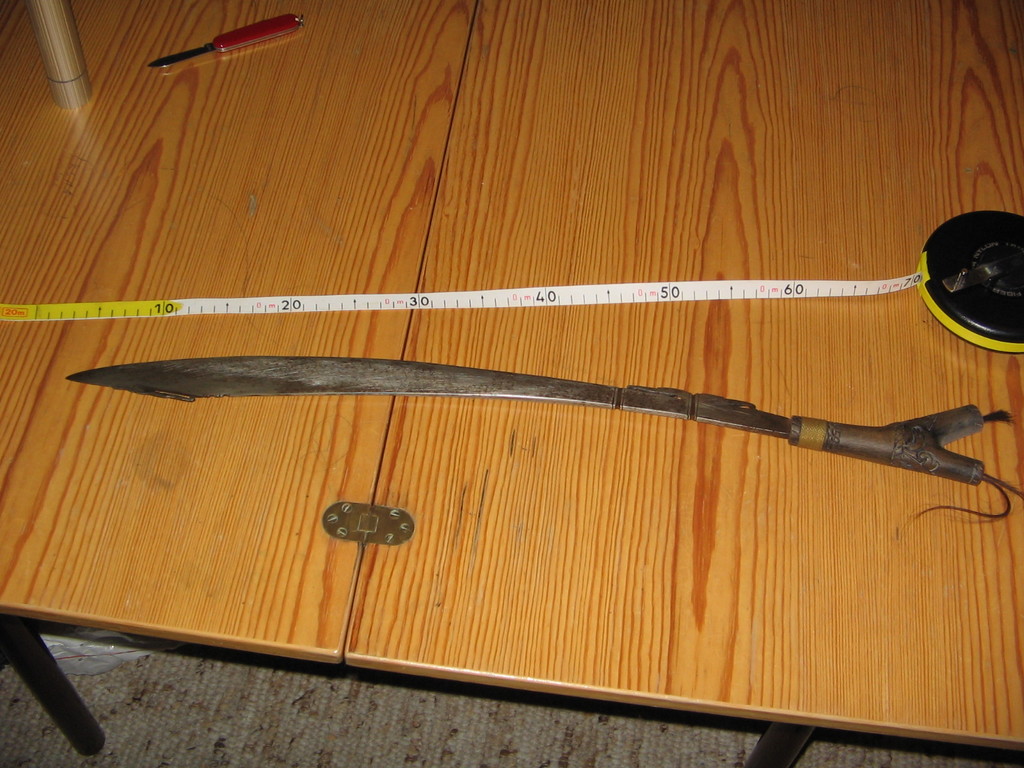  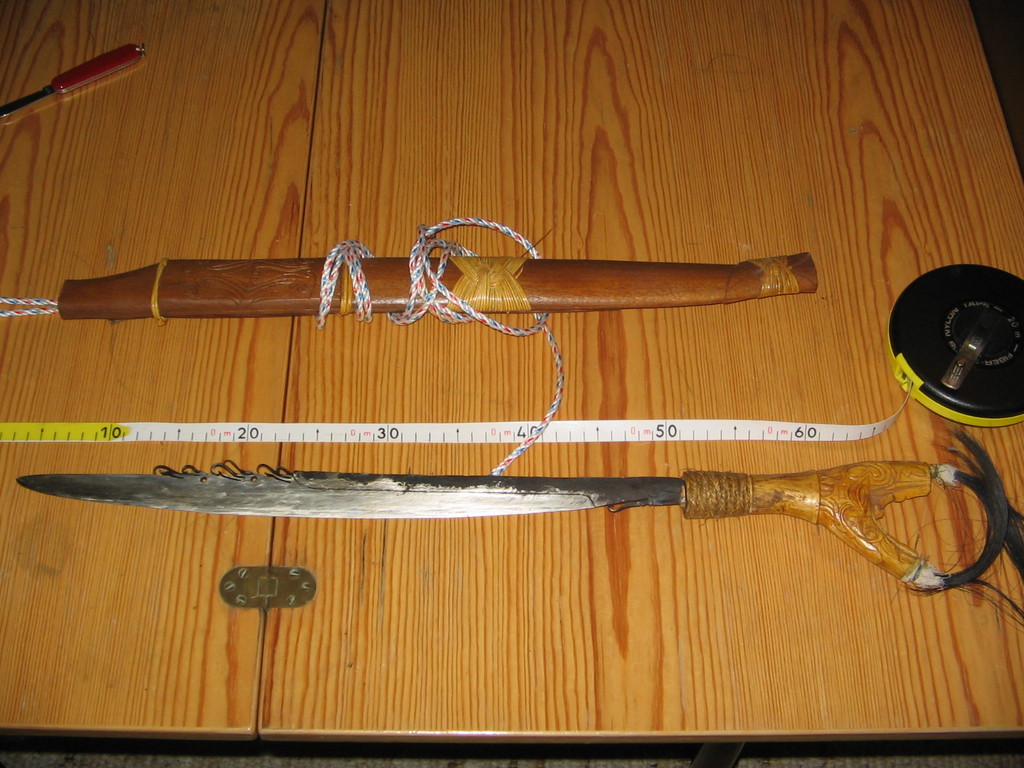
|
|
|

|
|
|
#29 |
|
Member
Join Date: Dec 2004
Location: Sweden
Posts: 1,637
|
Straight question = straight answer: They are all, except for maybe the first blade, for tourists or dancers, IMHO. The first one might be a utility blade?
Michael |
|
|

|
|
|
#30 |
|
Member
Join Date: Jan 2006
Posts: 29
|
Thank you.
So, basically as I expected. Yes the first one is a utility blade. It's not decorated, and the sheath is made from hardwood I think. It is very heavy and massive compared to the flimsy sheaths of the other parangs, despite being the smallest. |
|
|

|
 |
|
|